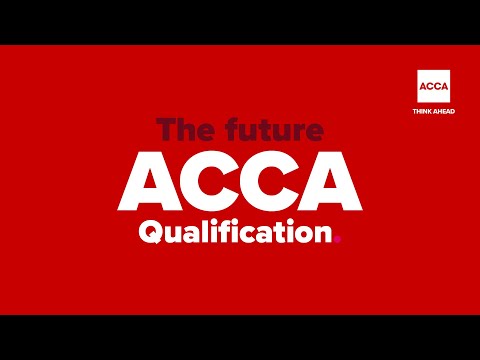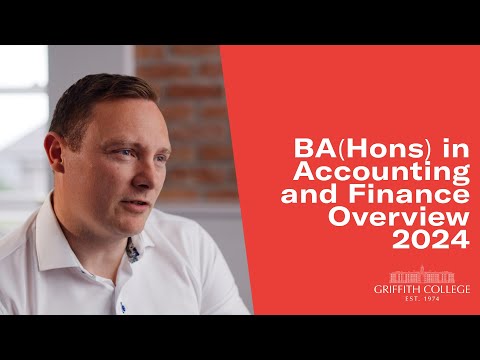BA (Hons) in Accounting & Finance

Course Overview
Gain the accounting, finance, and management skills needed for a dynamic career in the world of finance and business.
The BA (Hons) in Accounting and Finance degree is delivered on a full-time, part-time, and blended learning basis and is ideal for students interested either in a career in the accounting profession or who wish to develop the expertise to analyse business activities from a financial perspective.
Why Study Accounting and Finance at Griffith College?
This Accounting and Finance degree reflects the multiple requirements of today’s business and finance world, preparing you for a career in accounting, banking, stockbroking, currency trading, management, insurance, or positions in the financial sector. Whether you want to change career, improve job prospects, or are a school leaver, the BA (Hons) in Accounting and Finance is an excellent choice to develop your analytical techniques, economic expertise, and strategic insight needed for a successful career within the financial and business sectors.
- Students will be introduced to the course with a broad range of modules across a variety of disciplines.
- This course is ideal for students who are interested in the application of numerical techniques and the interpretation and communication of financial information.
- Students will develop a deep understanding of business, legal, and socio-economic environments in which finance and accounting operate.
- Students will build fluency in the technical languages and practices of the financial and accounting sectors.
- Once completed, students will have the necessary skills to pursue a dynamic rewarding career in accounting and/or the broader sector of finance/banking.
- Students can qualify for 9 ACCA exemptions and ACA CAP 1 exemptions.
- Students will receive lectures from vastly experienced professionals from a wide range of industries.
- Core areas of study such as tax, audit and assurance, wealth management, and management accounting will be covered.
- Students have the choice to switch in year 2 to the BA (Hons) in Business Studies/HRM/Marketing if they wish.
Course Highlights
- Excellent reputation within the industry
- Excellent rates of graduate appointments
- Convenient part-time city centre location
- Gain an honours degree in three years
- Excellent study progression opportunities
Intake Dates
- Cork - Part-Time - February 2026
- Limerick - Blended - February 2026
- Dublin - Full-Time - February 2026
- Dublin - Part-Time - February 2026
- Dublin - Blended - February 2026
- Cork - Full-Time - September 2026
- Dublin - Full-Time - September 2026
- Dublin - Part-Time - September 2026
- Limerick - Part-Time - September 2026
- Dublin - Blended - September 2026
- Cork - Part-Time - September 2026
- Cork - Blended - September 2026
- Limerick - Blended - September 2026
- Limerick - Blended - February 2027
- Cork - Full-Time - February 2027
- Cork - Blended - February 2027
- Dublin - Full-Time - February 2027
- Dublin - Part-Time - February 2027
- Dublin - Blended - February 2027
Download the Prospectus
Worried about commuting to class, have you considered Blended Learning?
Blended Learning combines traditional classroom based learning with online formats like webinars and lecture videos meaning you only have to travel to class one Saturday per month on campus. Read more about the blended learning course option here.
Are you applying through the CAO?
Check out our CAO HUB for everything you need to know about applying through the CAO!
Course codes
- Dublin: GC401
- Cork: GC401
Course Details
The Year One and Two finance/accounting and management modules act as a perfect introduction and development for the final year modules. In Year Three, three electives must be chosen. Elective modules are offered subject to demand.
If you have any questions in relation to this please contact the Admissions Office, [email protected].
Year One
This module aims to develop an awareness and understanding of the core functions, skills, and challenges of management in a dynamic global business environment. Learners apply management theories and concepts to current business situations, both in Ireland and internationally. Contemporary business management issues are explored using practical examples, case studies, and lectures.
This module seeks to instill in learners the importance of numeracy in the data-driven world of work into which they will enter. Mathematics equips learners with the confidence and tools to collect, interpret, and apply data to solve problems. Core concepts like statistics, financial mathematics, and algebra underpin many business applications such as pricing decisions in economics and business, and investment analysis in accountancy and finance, and is, therefore, a very important first-year module. Beyond mathematical computations, this module will enhance logical thinking, problem-solving, and learners’ attention to detail, all characteristics that are highly valued in today’s business world.
The principal objective of this module is to outline the role of technology with an emphasis on AI in business. It explores how information technology enables business processes so that an organisation can function and strive in a competitive environment: in other words, how technology is used to benefit business. This is achieved through the acquisition of practical information technology skills but also through an awareness and understanding of the overall role of technology.
This module seeks to provide learners with the tools to equip them both practically and emotionally to flourish as individuals and as scholars, preparing learners to succeed in education and the working world. The module will cover the academic requirements of research skills, referencing, and critical thinking skills together with practical skills such as goal setting, time management, and note taking. Emotional strength, empathy, and resilience is also addressed using case studies and discussions as these traits become ever more important in today’s world.
This financial accounting module introduces learners to basic theoretical and practical accounting concepts, explaining how they apply to different business environments. This module concentrates on the principles of recording, processing, and summarising business transactions and events, extracting a trial balance, and preparing basic financial statements for sole trader entities. Learners are introduced to the concept of controls in the realm of accounting through the completion of receivable and payable control accounts. This module is designed to provide learners with an understanding of how accountancy plays an important role in business organisations, highlighting the importance of recording financial information in an accurate manner and appreciating the importance of fostering ethical behaviours as part of the process.
This introductory finance module is designed to provide learners with foundational knowledge and practical skills in the field of finance. This module provides the learner with skills to explore the financial environment in which an entity must operate, as well as to understand the various methods that can be utilised to finance the various organisational finance requirements. This module aims to demonstrate the importance of working capital management and the tools to manage it, including an emphasis on cash flow. Whilst this module focuses on introducing basic finance-related concepts to the learner regarding different business requirements, this module also focuses on personal financial planning, outlining its importance in achieving financial stability and reaching long-term personal financial goals.
The Marketing Essentials module introduces learners to the fundamental principles of marketing. It is designed to equip learners with an appreciation for the role of marketing in organisations and an understanding of key concepts including consumer behaviour, segmentation, market research, marketing planning, and the contribution of digital to contemporary marketing. The module emphasises the importance of marketing decision-making allowing the learners to more fully understand the impact of these concepts on business.
The module aims to provide a balanced approach to both the theory and application of economic concepts. It introduces learners to the fundamentals of microeconomics and exposes them to the principle theories and models used in microeconomics. It also demonstrates how economics can be used by individuals and businesses alike to assess problems and develop solutions. The learners are encouraged to become more astute participants in the economy by employing economic principles and recognising the role of their behaviour, and that of others, in the world around them. In particular, the module introduces economic concepts, an analysis of demand and supply, theories of the firm, competition, elasticity, and behavioural economics.
This module introduces learners to the macroeconomic environment and the principles underlying macroeconomic policies. In particular, it addresses the causes and consequences of aggregate changes in the economy such as inflation, GDP, unemployment, and economic growth. Macroeconomics also examines and explores the role of government in influencing the direction of the economy through fiscal and monetary policies. This module also provides learners with real-world scenarios of how economies throughout the globe interrelate.
Year Two
This module is designed to broaden the learner’s knowledge with particular emphasis on the software used in accounting, finance, and business management. The module builds on the skills that have been acquired in the stage 1 modules such as Technologies for Business and Financial Accounting.
This module builds on the theories and concepts introduced in Principles of Microeconomics and Principles of Macroeconomics in stage one. It provides learners with a deeper understanding of economics in the context of real-world issues. The module will equip learners with the necessary tools and analytical methods to apply economic theory to practical problems, focusing on contemporary economic issues and policies. Learners will gain an appreciation of what impacts interest rates, inflation, and fiscal and monetary policy, all of which have direct implications for business investment, funding, and valuation decisions.
This module aims to foster learners’ understanding and knowledge of the general principles of Irish law which are introduced in relation to the effect, influence, and impact of law in business. Learners are enabled to apply relevant law to practical business situations. Learners acquire a knowledge of the areas of law most pertinent to business such as Contract, Agency, and Employment Law. Learners develop a particular understanding of company law, with emphasis on the Companies Act 2014.
This module builds on the basic financial accounting techniques introduced in Financial Accounting at Stage 1 and further develops knowledge and understanding of more advanced financial accounting and reporting concepts and principles. In this module, learners are introduced to the regulatory and legal framework in which financial reporting in Ireland occurs. Additionally, this module introduces learners to accounting for partnerships in Ireland.
Upon completion of this module, learners are able to understand and apply the nature, scope, and role of financial reporting; including the preparation and analysis of financial statements for unincorporated entities.
The objective of this module is to develop the knowledge and skills required of a finance manager in relation to investment, financial analysis and financing decisions.
This module provides the learner with skills to explore the financial environment in which an entity and its managers must operate, to assess capital investment situations, as well as to understand the various methods that can be used to finance capital investments. It looks at financial markets and international finance as well as risk management strategies. Green and sustainable finance is also reviewed. Finally, it provides the learner with the means to conduct financial analysis, measure performance and efficiency.
This module builds on the basic financial accounting techniques introduced in previous modules at stage 1 and further develops knowledge and understanding of more advanced financial reporting concepts and principles.
International Financial Reporting Standards (IFRS) are introduced to learners and developed for incorporated entities. Learners gain an understanding of the IFRS conceptual framework and legal underpinning of single company financial statements preparation.
The aim of this module is to ensure that learners develop the required knowledge and understanding of the various cost accounting principles, concepts, and techniques appropriate, for planning, decision-making, and control, and the ability to apply these techniques in the generation of management accounting reports.
The purpose of this module is to develop appropriate skills and knowledge in learners which is intended to prepare them to source employment opportunities and enter the workforce successfully. The module enables learners to gain a broad understanding of the numerous, and diverse range of activities, that combine to secure employment and /or internship opportunities. Furthermore, the module aims to develop learners’ personal and professional skills so that they may act confidently and appropriately in a range of interpersonal business functions.
Year Three - Mandatory Modules
This module builds on the concepts, conventions and principles introduced in the Financial Accounting and Financial Accounting and Analysis modules at stages 1 and 2 of the programme. The module aims to develop the learner’s knowledge and skills in understanding the application of accounting standards, and the theoretical framework involved in the preparation and analysis of individual and consolidated financial statements, including business combinations. Understanding the implication of various environmental matters forms part of the analysis in this module.
This module further develops the principles of financial management outlined in the Financial Management and Analysis module and introduces other topics appropriate to the strategic aspects of finance. The aim of this module is to provide learners with an understanding of how entities acquire resources and allocate them among present, and future, activities and projects.
The learner develops the knowledge and skills required of a finance manager in relation to finding and allocating capital to increase the wealth of the firm’s shareholders. Over the course of the module, concepts such as corporate objectives, capital investment appraisal, business risk, financial risk, weighted average cost of capital (WACC), working capital management techniques, the valuation of financial assets, and risk management are studied.
The aim of this module is to provide learners with the opportunity to grasp the theoretical principles behind corporate governance and to examine its application in specific cases. The module focuses on the similarities and differences that exist between the different corporate governance regimes around the globe with an emphasis on looking at a principle versus rules-based system. International practices along with specific national codes are examined accordingly.
This module aims to develop learners’ knowledge and understanding of the workings of the Irish tax system, in relation to corporation tax and capital gains tax, for both companies and individuals. Learners develop the ability to apply knowledge and skills in providing taxation information to individuals and corporations on the impact of these taxes. Learners are provided with the opportunity to explore the impact of these taxes on the transactions of individuals, partners, and companies.
This module builds on the concepts, conventions and principles introduced in the Financial Accounting, Financial Accounting and Analysis and International Financial Reporting modules at stages 1 and 2 of the programme.
The module aims to develop learner knowledge and skills in understanding and applying accounting standards, and the theoretical framework involved in the preparation of financial statements for single incorporated entities. It also looks at the accounting implications of certain environmental matters.
This module builds on the knowledge acquired at stage 2 of the programme in modules such as Management Accounting. The aim of the module is to provide the learners with an understanding of performance management principles. It enhances and further develops the learner's ability and awareness of performance management techniques to support management in planning, controlling, and monitoring performance in a variety of business contexts.
On completion of this module, the learners are able to apply the knowledge and understanding of the costing techniques, planning, analytical and decision-making tools and concepts, and performance measures techniques that underpin performance management.
Elective Modules
Upon completion of this module, the learner attains the appropriate knowledge and skills to apply and exercise good judgements in the understanding, analysis, and conclusion of the assurance and non-assurance engagement, in the context of best practice and current developments in the field. The module enables the learner’s understanding of the application of underlying regulations and professional standards relevant to assurance and non-assurance engagement. The learner considers and reflects on the ethical and professional requirements of the auditor in selecting clients, performing assurance and non-assurance engagements, and reporting on these engagements.
This module focuses on the fundamental principles of banking and outlines the main banking product suite. The objective of the module is to provide learners with an understanding of the banking model and liquidity management at an introductory level. Knowledge of these topics is imperative in the world of finance due to their relationship to the global financial crisis in 2008. Sound practices in relation to asset and liquidity management will help mitigate future financial crises. In this regard, the module also covers relevant regulatory frameworks and actors.
The aim of the module is to prepare learners for future accounting and finance professions. Graduates require the skills to adapt to a fast-paced industry where technology is key to the future of the professional world.
This module considers the impact of political, technological, social, and ethical influences on the accounting and finance professions, in both national and international contexts. The learner explores current and emerging issues that impact the professional world. Technology is a key focus of the module with research on the impact of emerging technologies on the accounting and finance professions.
The module encourages graduates to look beyond numbers to the future of the financial world.
In this module, you'll learn the fundamental principles and methods used to evaluate company equity. You'll explore key valuation techniques, financial statement analysis, and market-based approaches to assess a firm's value and investment potential. The module will help you build practical skills for analysing stocks and making informed investment decisions.
This module is designed to broaden the learner’s knowledge with particular emphasis on the software used to analyse data. The module builds on previous spreadsheet skills by focusing on data-specific analysis and related tools. It also is designed to help learners become aware of the ever-increasing discipline of data analytics and business intelligence used by the organisation.
This module provides an in-depth understanding of fixed income instruments such as government and corporate bonds. Students will explore pricing, yield calculations, interest rate risk, and the role of fixed income in portfolio management. Emphasis is placed on valuation techniques, credit risk assessment, and the impact of macroeconomic factors on bond markets—equipping students with essential skills for careers in investment analysis, treasury, and financial risk management.
This module is designed to develop the learner’s ability to interpret, understand, and apply the principles and legislation governing the Irish taxation system in relation to income tax and value-added tax (VAT). It provides learners with an understanding of the various reliefs and exemptions available to individuals. It develops the ability to apply knowledge and skills and exercise appropriate and ethical judgement in providing taxation information to individuals on the impact of income tax on the transactions of individuals and partners.
This module covers the basis of portfolio theory from the relationship of portfolio characteristics to security characteristics to the method of computing sets of portfolios that investors find desirable. It introduces learners to the main characteristics of different asset classes and the theory of modern portfolio analysis.
The module aims to develop learners’ understanding of the underlying rational portfolio choice and what this means for prices determined in the marketplace.
The aim of the module is to provide learners with an opportunity to experience the techniques and practical approaches to managing projects. This includes the core concepts of project management focusing on project justification, the strategic relationships between the project and the organisational vision and mission, choosing project alternatives, creating awareness of risk, and implementing control mechanisms.
Understanding project constraints in terms of time, cost, quality, and client acceptance provides a sound introduction to project management. Alternative methodologies are also introduced to learners along with an awareness of new trends in the field.
CAO
BA (Hons) in Accounting & Finance
CAO Course code: GC201 (Cork); GC401 (Dublin)
The BA (Hons) in Accounting and Finance degree is delivered on a full-time, part-time, and blended learning basis and is ideal for students interested either in a career in the accounting profession or who wish to develop the expertise to analyse business activities from a financial perspective.
How to Apply:
- Go to cao.ie
- Log in to your account
- Enter the course code GC201 (Cork); GC401 (Dublin)
- Add or re-rank your preferences
- Save changes
Click below to see the important dates, such as: CAO Application Opens; CAO Application Closes; Change of Mind Dates
CAO Important Dates
Entry Requirements (CAO Applicants):
2 H5 and 4 O6/H7 grades, to include a language (English, Irish or another language) and Maths.
Typical Points range 254 – 264.
Schools Events:
We also host a range of school events throughout the academic year. To view the schedule or register, please click the link below.
Fees:
Please refer to the Fees tab for detailed information on fees at Griffith College.
Contact:
If you’d like to learn more about this course or have any questions about studying at Griffith, contact us at [email protected], and our team will be on hand to help.
You can also book a campus tour to see our facilities, meet our staff, and get a feel for student life.
Timetables
Please be advised that the timetables below are valid for Semester 1 of the Academic Year 2025 / 2026 for the Dublin Main Campus and are subject to change or changes in the first few weeks of the semester. Ensure you regularly check your Business Student Info page on Moodle for the most up-to-date files.
Full-Time Timetables
Part-Time Timetables
Blended Timetables
Cork and Limerick timetables will be made available closer to the starting date.
How to Apply
Entry Requirements
Leaving Certificate
2 H5 and 4 O6/H7 grades, to include a language (English, Irish, or another language) and Maths.
QQI Level 5 Award
A minimum Full QQI Level 5 Award with 3 Distinctions and a Pass or higher in all other remaining subjects.
International Applicants
Please contact the International Office Team to enquire about entry requirements for international qualifications.
English Language
If English is not your native language, you must show that your English level is suitable. For further information, please contact a member of the Admissions Team.
Griffith College is accepting the online Duolingo English Test (DET) as valid proof of English proficiency.
For more information, please visit here.
How to Apply
Applicants under 23 years of age:
Applicants under 23 years of age on the 1st of January of the year they wish to enter must apply through the CAO. Please consult the CAO website for information on important dates for applications.
CAO Codes
- Dublin - GC401
- Cork - GC201
Applicants over 23 years of age (mature students):
If you are 23 years of age on or before the 1st of January of the year you want to enter, you may apply as a mature student. Mature students must apply to Griffith College directly online using the Apply Online facility on the website homepage or the button below. Mature applicants will be asked for a copy of their passport.
Fees
For purposes of fee calculation, residence is counted from time of application.
Please note that not all study modes may be offered at all times; for confirmation, refer to the Intake dates on the Overview tab.
Tuition Fees
Study Mode: Full-Time
Dublin : EUR 6,600.00
Cork : EUR 5,250
Limerick : EUR 4,750
Study Mode: Part-Time
Dublin : EUR 4,600.00
Cork : EUR 4,600.00
Study Mode: Blended
Dublin : EUR 4,600.00
Cork : EUR 4,600.00
Limerick : EUR 4,600.00
Study Mode: Full-Time
Please refer to the Irish/EU Living Abroad Fees
Study Mode: Full-Time
Please refer to our Non-EU Tuition Fees section.
Non-EU students: a Student Services and Administration fee of EUR200 is payable each academic year in addition to the fees quoted below.
An Academic Administration Fee of €250 is payable each September at the start of term. For students starting in the January/February term, €125 is payable in February, and then €250 will be payable each September from then onwards.
A 2% Learner Protection Charge is applicable each academic year in addition to the fees quoted. The fees above relate to Year 1 fees only.
Flexible payment options
Students wishing to pay their fees monthly may avail of our direct debit scheme. Please view our Fees information page for more information and assistance.
Sponsorship
Is your company paying for your course?
They will need to complete a Griffith College Sponsorship Form and send this to the Student Fees Office:
- Post: Student Fees, Griffith College Dublin, South Circular Road, Dublin 8
- Email: [email protected]
Cork
- Post: Student Fees, Griffith College, Wellington Road, Cork
- Email: [email protected]
2% Learner Protection Charge
All QQI-accredited programmes of education and training of 3 months or longer duration are covered by arrangements under section 65 (4) of the Qualifications and Quality Assurance (Education and Training) Act 2012 whereby, in the event of the provider ceasing to provide the programme for any reason, enrolled learners may transfer to a similar programme at another provider, or, in the event that this is not practicable, the fees most recently paid will be refunded.
QQI Award Fee
Please note that a QQI Award Fee applies in the final year of all QQI courses. To find the relevant fee for your course level, please see the Fees page.
Progression
Academic Progression
Upon successful completion of their honours degree course, graduates may wish to continue their studies with a postgraduate qualification in Griffith College or with one of the many third-level institutions in Ireland or abroad.
The Griffith College Graduate Business School offers a portfolio of programmes that may be of interest. The following programmes prepare graduates for the world of international business; at MSc and MBA levels, and in full and part-time modes.
- The MBA in International Business programme is divided into three stages, taking one year to complete full-time and approx. Two years part-time.
- The MSc in International Business Management is divided into three stages, taking one year to complete full-time and approx. Two years part-time.
- The MSc Accounting and Finance programme is divided into three stages, taking one year to complete full-time and approx. Two years part-time.
Professional Accountancy Exemptions
Graduates of this programme may wish to pursue further studies to qualify as an accountant. They can gain substantial examination exemptions from the following professional accountancy bodies:
- 9 ACCA Fundamental exemptions
- ACA CAP 1 exemptions
Griffith College School of Professional Accountancy provides tuition for a number of professional body examinations. You can review available online, part-time, and e-learning tuition options here.
Career Progression
The programme gives you an understanding of the business, legal, and social environments in which accountancy operates and enables you to be conversant in the technical languages and practices of the accounting sector in a market economy. These include measurement and disclosure in financial statements, managerial accounting, auditing, taxation, and business law. While typical careers focus on the world of finance and accounting in particular, any aspect of the business arena is open to graduates. Read more about alumnus Johanna Walsh’s story who is group CFO within an artificial intelligence company. A significant advantage is the many exemptions from the professional exams for which graduates of the course are eligible. Students who do not wish to focus on a career as an accountant will find numerous opportunities in banking, stockbroking, currency trading, management, insurance, or positions in the financial sector.








